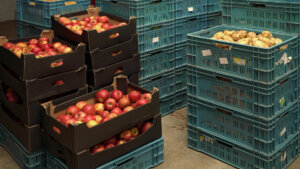By investing in modern supply chain planning and optimisation technology, grocery retailers can improve their profitability and sustainability simultaneously.
Food waste is a serious problem that can only be solved through a combination of both individual and collective efforts. This in effect means grocery retailers have an opportunity to reduce their carbon footprints, cut food waste and increase their profitability when they actively commit to making a positive global impact. That’s according to Johanna Småros, Co-founder & CMO at RELEX Solutions.
Johanna Småros said, “Accurate demand forecasts are essential to making the right amount of stock available in the right place at the right time. Today’s supply chain planning solutions increase forecast accuracy by using machine learning to capture the impact of hundreds of demand-influencing factors such as local events, pricing, promotions, product, and day level.
Accurate and granular forecasts help retailers optimise each store order to balance high availability with a low risk of waste. Advanced supply chain planning solutions automatically factor in things like demand and demand uncertainty, product shelf life, sales margins, and availability of substitute products to optimise store orders for maximum profitability.
Småros continued, “Advanced software can help reduce food waste upstream in retail supply chains. When retailers connect stores, distribution centres and suppliers through technology, they can remove a lot of guesswork from the supply chain. Instead of requiring distribution planners to estimate when and what stores will order, a modern supply chain planning solution provides automatic visibility into future store orders, enabling distribution centres to achieve better service levels with higher inventory turnover.”
“Modern supply chain planning solutions can also keep track of the expiration date of every single batch in stock. When combined with accurate demand forecasting, the system can spot the risk of overstock much earlier – before goods expire. Retailers can then react to these early warnings either by pushing stock through their supply chains more quickly, often with the aid of markdowns, or making charitable donations while the products still have appropriate shelf-life left.”
“Advanced supply management solutions drive fresher products, higher operational efficiency, and the ability to free up capital from inventory enabling further investments in sustainability. The savings from food waste reduction are so significant that they more than cover the cost of the technology. Adopting these solutions has enabled retailers to reduce food waste by anything from 10 to 40 percent while maintaining, or even improving, on-shelf availability and perishable freshness.”
Småros concluded, “Strategic investment in state-of-the-art supply chain technology is a critical initiative for today’s grocery retailers. Rather than focus on the initial cost of improving supply chain processes, grocery retailers need to step back and look at the bigger picture. With a high return on investment, a modern software solution is a true win-win for grocery retailers who can reduce food waste and also maintain their profitability and customer service levels.”






